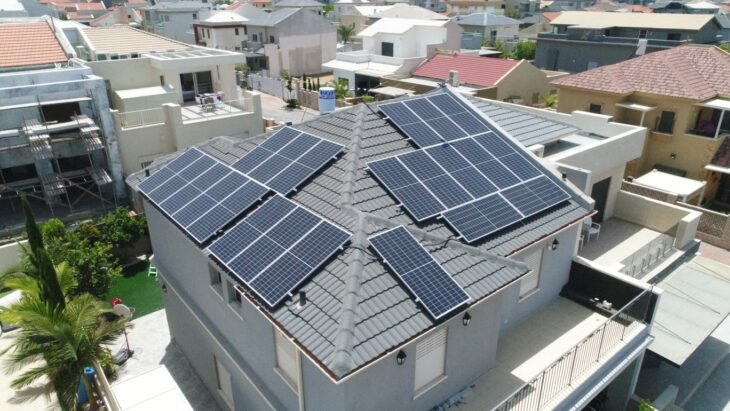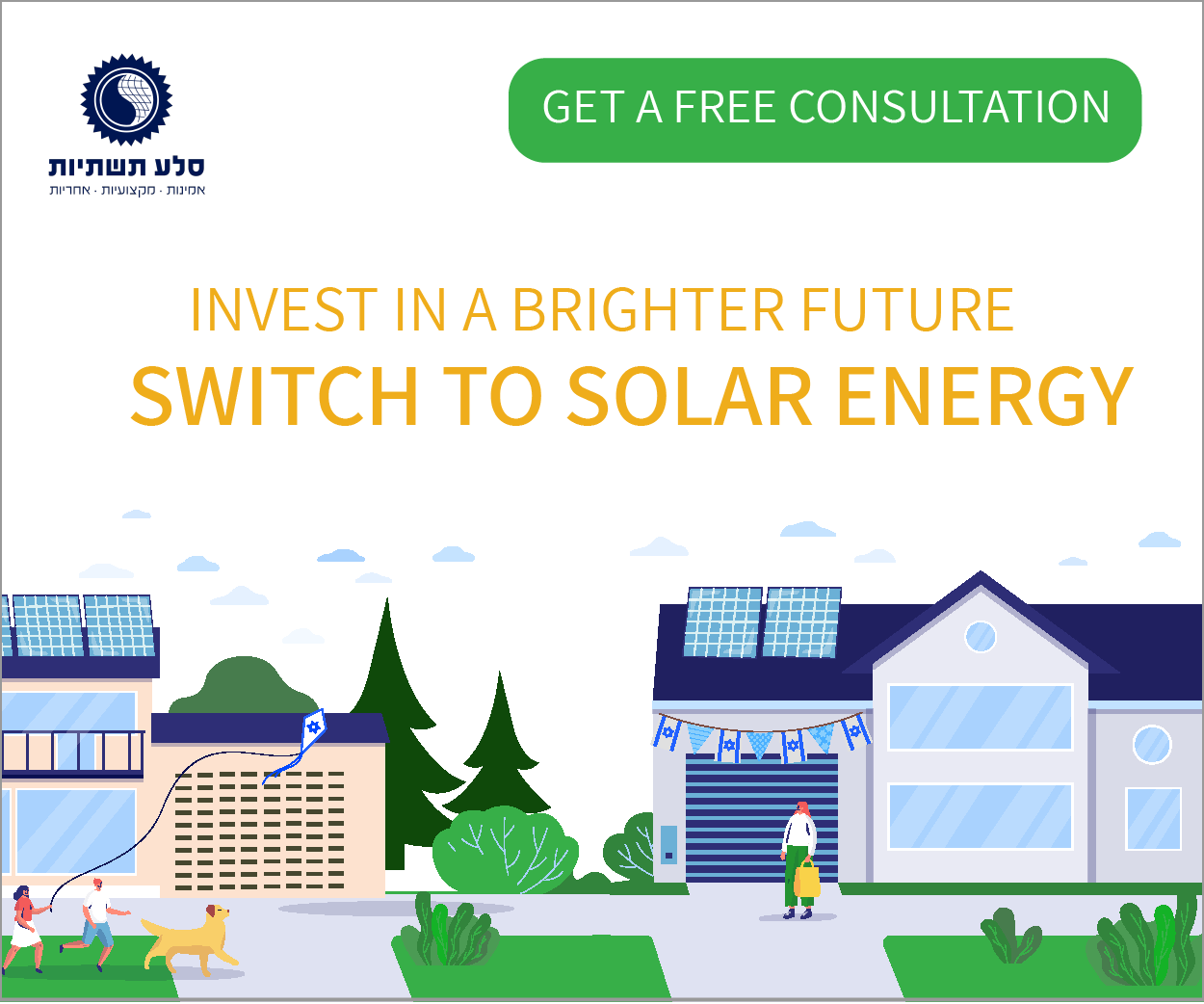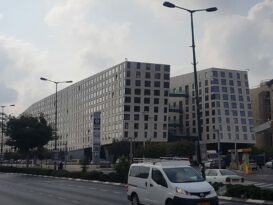In order to meet Israel’s goal of increasing the production rate of green energy to 30% within a decade, the State is promoting legislation that allows owners of private homes and commercial buildings to set up a solar power plant on the roof. While the system can bring a double-digit return on investment for some, for the hundreds of thousands who own apartments in shared buildings, it is not yet profitable.
Over the past few years, it has become more and more popular for homeowners in Israel to set up solar panels on their roofs or in their yards — and for good reason. Solar systems can be quite a lucrative investment, as property owners first produce electricity for their own consumption, with the possibility of selling any surplus directly to the electrical company. Between the annual return and tax exemptions, solar panels can bring owners a yearly ROI of more than 10%. However, at the moment, those who own private homes and office buildings are most likely to benefit from this unique investment route, while it remains unprofitable for those who own apartments in shared buildings.
The investment model for solar energy has evolved over the last decade, as Israel has put more of a focus on increasing the rate of green electricity generated from renewable energy sources, most notably – sunlight. In October 2020, the government set a target for 2030, by which time 30% of all electricity produced in Israel would come from renewable sources. This decision came after the State failed to meet its previous goal of 10% by 2020. This year, the rate of green energy produced was only 5.85%.
How to install solar panels
When setting up solar panels, the first step is contacting a company that installs solar systems. Today in Israel, there are many companies of this type in the growing market, and it is worthwhile to conduct thorough market research and get recommendations from others who have already been through the process. In general, it should cost between sixty and a hundred thousand shekels to install a solar energy system on a residential home, depending on a number of variables, the main one being the size of the system.
In order for the project to be cost-effective, it is recommended to set up solar panels in an area of at least 50 square meters. Naturally, installing a larger system is more expensive, but the income from electricity production increases in direct proportion to the area, so in the long run, it makes sense to install the largest system possible. Solar panels can be set up on either slanted or flat roofs, but they should always be south-facing in order to maximize the hours of exposure to direct sunlight.
Cost, income, and profit
The economic model is quite simple. A solar panel of about 100 square meters costs roughly NIS 70,000 to install and produces an average of 10 kilowatts of energy per hour. Assuming there will be about 1,700 to 1,800 hours of sunlight per year, at the current rate of about half a shekel per kilowatt, solar panels should bring an annual income of NIS 8,000 to 9,000. This number indicates an annual return of 12% and a full return on investment within about 8 years. Most of the electricity generated is used by the investor and automatically deducted from the electricity bill. Beyond this, any surplus energy is transferred directly from the system to the electrical company, providing additional income to the investor.
What about the bureaucracy?
While the legislation enabling the construction of home solar systems has been in place since 2009, in practice, very few people in Israel chose to do so until a few years ago because of the endless regulatory barriers along the way. Things changed in 2016 when the government significantly reduced the bureaucratic process. Today, one does not need to get a building permit in order to install solar panels, and these projects are exempt from both betterment tax (Hetel Hashbacha) and municipal taxes (arnona).
However, the property must still meet some regulatory requirements. First, the structure must have Tofes 4 — indicating that the construction has been completed according to plan and that the house can be connected to permanent electricity. In addition, the installation company must issue another series of permits before executing the project. Among other things, the plan must be submitted for approval from the local planning committee and from an engineer that works on behalf of the Israel Electric Corporation. In addition, even before the system is set up, the IEC must replace the standard one-way meter designed exclusively for electricity consumption with a two-way meter that allows electricity to be exported to the national grid. In total, from the time a person first contacts a solar system company through installation, the entire process should take somewhere between six months and one year.
House of the Sun
According to Dani Waxman, an American-born homeowner in the Nofei Aviv neighborhood of Beit Shemesh, the process between ordering the panels and installing them took a little over three months: “I ordered the panels in mid-November and the installation was completed by the end of February,” he says. The installation, of 25 solar panels that provide 13.5 kilowatt-hours, was carried out by a local solar company, at a cost of about NIS 60,000 which, according to expert estimates, he should make back within 7 years.
On considering the investment, Waxman says: “I saw that the price of panels went down but that their quality improved. Seven years is a reasonable time for a return on investment, and in any case, I feel I invested that money in my home and not in the electricity company. And, at the end of the day, it’s a step toward saving the environment”.
Is it profitable for all?
For private homeowners, there is no question that installing a solar system on the roof is a lucrative investment. However, for those who own apartments in shared condominiums, the story is not so simple. While legally, there is nothing stopping apartment owners from doing this in the exact same way as private homeowners, they need to first get the consent of at least two-thirds of the other apartment owners in the building. Because of this technical detail, it is far less common to see private solar panels on apartment buildings.
In an article recently published in the economic daily newspaper, Globes, the Israeli Energy Forum explained additional factors complicating the situation. First of all, the roofs of shared buildings are already loaded with various systems, including solar water heaters and air conditioners, meaning there is far less space available for solar panels. More importantly, the potential for economic gain drops significantly when installing these systems on apartment buildings. The same 100 square meter panel that brings in NIS 8,000 to 9,000 a year becomes less attractive when the income is divided between 9 or 12 apartment owners. In most cases, the minimal profit simply does not justify the significant investment.
Global climate crisis and dependency on oil
In addition to receiving a handsome ROI, transitioning to solar panels also allows homeowners to do their part in shifting the economy toward green energy production, which will hopefully reduce polluting energies and help fight the global climate crisis.
Another advantage to expanding the use of solar panels is that it reduces Israel’s dependence on oil-produced energy, which in today’s world affords great power to a fairly small number of countries, most of which are characterized by problematic regimes, to say the least. This could not be any clearer than it is today when, despite Western sanctions, the Russian economy continues to exist as a result of its vast oil and gas reserves. Other countries with controversial regimes that leverage their oil exports for economic, political, and military power are Iran, Saudi Arabia, Venezuela, Libya, and Nigeria.




